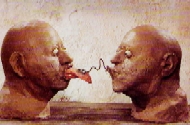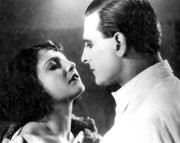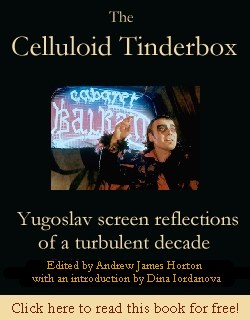A camera tracks a naked woman through the trees and she bathes in a lake in longshot. Hedy Lamarr's famous debut sent shock waves around the world. Extase (Extasy, 1932) was sold to nearly thirty countries and banned in four (including the USA and Britain). Its story tells of an attractive young woman (Hedy Kiesler, later Lamarr) who, trapped in a marriage to a boring and inconsiderate husband, runs away and begins an affair with another man. It was not just nudity and eroticism that aroused the censor's wrath, but also the films questioning of the sanctity of marriage. The title "secretly I and Bill were married" was eventually sufficient to remove US opposition.
The film made Czech director Gustav Machatý famous, but an abortive Hollywood career left him with the reputation of being a one-film director. Yet The Kreutzerova sonáta (Kreutzer Sonata, 1926), Erotikon (1929), From Ze soboty na nedeli (Saturday to Sunday, 1931) and Extase won him a prize for best direction in the world's first competitive festival at Venice in 1934.
But the power of Machatý's work becomes particularly apparent in the newly reconstructed print of Erotikon, which has the advantage of a specially composed score performed live with musicians from the Czech Symphony Orchestra. The music by one of the Czech Republic's leading composers Jan Klusák, provides a remarkably supple and sympathetic accompaniment. Klusák had previously composed for films as various as Evald Schorm's Návrat ztraceného syna (Return of the Prodigal Son, 1966), Jan Nemec's Mucedníci lásky (Martyrs of Love, 1966) and Jan Švankmajer's Možnosti dialogu (Dimensions of dialogue, 1982). His first score for silent film was for the reconstructed version of Henri Fescourt's 1928 Monte-Cristo (The Count of Monte Christo).
The new print of Erotikon, complete with the Czech Symphony Orchestra playing Klusák's score, will shortly be on show at Britian's National Film Theatre and at the Leeds International Film Festival. Central Europe Review interviewed Jan Klusák in Prague on Erotikon and his work as a film composer and as an actor in the Czech New Wave films of the 1960s.
CER: I'd like to begin by asking you about your work as an actor in the Czech New Wave films of the 1960s. In particular, you played a major role as a somewhat mad head of the secret police in Jan Němec's banned film O slavnosti a hostech (The Party and the Guests, 1966). How did that come about?
Jan Klusák: In 1962, I was at Šumperk. I wrote some stage music to Eugene O'Neill's Ah Wilderness!. Ester Krumbachová did the sets for the play. We went to a tavern called the Palm Beach Bar and stayed there until the morning. It was summer—June—and it was light in the morning. Krumbachová and the others were having a serious adult conversation and I was bored. I was in a good mood and I was pretending to be a bird. When Ester saw me, she said, "I'd like to have you in my next film. I have the part of a crazy person and you could play it." I agreed, but didn't expect anything. And three years later, she came to see me, and that was it.
CER: I spoke to Jan Němec recently, and he said that nothing in that film was intended to be directly political, but I'm not sure that I agree with him. Did you base your character on any observation of the politics of the time?
JK: Němec and Krumbachová deliberately denied the political nature of the film. They were very careful. Today there's no need to deny it. Maybe Němec wants to stress that it's not merely a period satire but transcends its time. Like Ionesco.
CER: How did you decide on the particular style of your performance?
JK: I have no style. I always say that when you film me, it's like filming a dog or an animal, because you must shoot whatever the animal does.
CER: But it was a crazy, zany performance. There were hints of slapstick comedy—or Jerry Lewis.
JK: That's what I'm like. They picked me because I reminded them of the character in my private life.
CER: You appeared in several other films at that time.
JK: I enjoyed being in films. Věra Chytilová's Sedmikrásky (Daisies, 1966) and Němec's Mučedníci lásky.
CER: Mučedníci lásky was shown in London just before Christmas. It's virtually unknown in Britain, but it received a surprisingly good reception after so many years.
JK: It's like surrealism or a dream.
CER: Were you involved in composing the music for the film?
JK: Karel Mareš and myself split the work. I composed the main music for this story I was in—songs as well. There was one for Karel Gott, a baroque aria à la Bach.
CER: The film is strangely evocative. I think it's very clever. Was that the only film in which you combined both acting and composing?
JK: I also composed for Jiří Brdečka's Pražské noci (Prague Nights, 1969). Ester Krumbachová used to say that there were only two composers who combined composing and acting, myself and Chaplin.
CER: It has always struck me, from looking at Czech films, that there is a very strong school of film composition.
JK: There was also a strong tradition before the war. Jiří Fiala, the brother of Eman Fiala, and Jiří Trnka. Julius Kalas, who composed for Vlasta Burian's films. Then there was Václav Trojan's work for Jiří Trnka's films. Trojan was our professor. We had a seminar on stage and film music. It was only for third-year students, but I went there for all four years, because I liked Trojan very much. He was a charming man—I was happy that I could go and listen to his lectures. He would talk about many things—opera, theatre, literature, art, Picasso, but he never mentioned film. When I asked him, how do you compose music for a film, he would say, "Don't become a prostitute, my boy." I thought, well, he's doing it, why shouldn't we compose music for film?
CER: Was it in the 1950s that you were studying?
JK: From 1953 to 1957.
CER: I suppose that was a difficult time for music.
JK: Everything was suspicious. Formalism. When the Communists didn't like you, you became a formalist.
CER: But your work, to an uninformed person like myself, seems very modernist, drawing from serialism. It seems almost the epitome of what they would object to. How were you able to follow this path as a student?
JK: I always wanted to do my own thing and go my own way. But some of the professors were quite angry with me.
CER: After you graduated, did you begin as a concert composer or as a stage and film composer?
JK: I had to go into the army first, for 18 months. I was freelance and never had a steady job. I did concert work, but it was a hard living in the beginning. It was three to four years before I began to get some jobs for film and theatre. First I was a poor person like in La Vie de Bohème.
CER: I notice that you worked a lot with Evald Schorm. I would describe his films as "realist," yet your music is not realist. Was this a deliberate juxtaposition?
JK: That's what Evald liked. My music is in counterpoint, which is unreal. That's what he wanted. He didn't want descriptive music.
CER: I remember some scenes—for instance, the end of Návrat ztraceného syna (Return of the Prodigal Son, 1966). The film ends on a cross—the window of the asylum—and your music acts as a kind of punctuation. It's a very powerful ending. Didn't you work on Chytilová's film Strop (Ceiling, 1962)? The last sequence of that film, with its abstract focus, has some similar effects.
JK: Yes, I faced a similar situation.
CER: Do you know if that ending of Strop was totally original? It's very like the ending of Antonioni's L'Eclisse.
JK: Chytilová was very inspired by contemporary filmmakers. Before making this film, she held screenings at FAMU. You could see the models she liked. For instance, Hiroshima mon Amour (1959), maybe Last Year at Marienbad (1961), and Antonioni. I like Antonioni very much—L'Avventura (1960), La Notte (1960), The Red Desert (1964), Blow-Up (1966). He's a great stimulus for music.
CER: More recently, I notice that you have worked with Jan Švankmajer.
JK: Twice, on Zánik domu Usherů (The Fall of the House of Usher, 1980) and Možnosti dialogu (Dimensions of Dialogue, 1982).
CER: What was your collaboration with Švankmajer like?
JK: Very pleasant for me, and he was happy enough. He had previously worked with Zdeněk Liška, who died. Liška was an ideal collaborator with the two or three techniques he used. The film would have perfect sound and the music would not attract attention. Which is ideal for Švankmajer. Maybe I disturbed the visual aspect with my music. We discussed this. He didn't want music. He uses noises, real sound. Musique concrète.
CER: It seems as if, to some extent, your music was a transition between Liška and Švankmajer's opting for real sound. I suppose he is now his own composer.
JK: The ideal situation. I praise him for this. I interfered too much with the films.
CER: I don't know about that—I know a lot of people who can't remember
 |
| The dimensions of Švankmajer |
JK: I tried for a parallel line with Švankmajer. Pierre Henry, the composer of musique concrète, also worked in films. They had these sound objects, which combine with the image. Very material. Maybe I failed.
CER: Maybe you succeeded. Možnosti dialogu is an eye-opening film. I think it's the most significant of Švankmajer's films, because it connects with so many people.
JK: I like the earlier films with Liška's music.
CER: Is Erotikon the first silent film for which you have written the score?
JK: Monte-Cristo was the first, in 1992.
CER: How did the project for Erotikon come about?
JK: Vladimir Opela of the National Film Archive and the French Institute in Prague made a deal. The French would restore Erotikon and I would compose the music for the film. They already had some experience with Monte-Cristo, so they knew that I wouldn't spoil the project. There would be openings in Paris and Prague. The French wanted six musicians for the orchestra (five musicians and a conductor).
CER: Why did they specify that?
JK: So that you could transport the musicians and have a live group, so that they could fit into cinemas.
CER: Did you find that a restriction or an advantage?
JK: An advantage. I like to have some kind of restriction.
CER: In approaching silent film, did you work the same way as with sound film?
JK: In a different way, because you have to cover the whole space/time with the music. Nothing will save you. It's a time ballet really, the longer the film lasts. Monte-Cristo is three hours, so there are two parts. It's like a Wagner opera. Erotikon is about 100 minutes. Film music is no joke.
CER: Did you still try to use counterpoint?
JK: I enjoy it when they do a dance in the film, in the bar. In Monte-Cristo, at the opera, there is a ballet. You compose something and it's interesting to see how it works. It's funny how it fits.
CER: With Erotikon, do you try to be ironic?
JK: I attempt that very often in my music, but it's difficult to be ironic in music. Beethoven was the first to do it with his Eighth Symphony and its ironic hints at Haydn, who was his teacher. Mahler is also a master of musical irony. I tried to learn from them.
CER: Were you trying to be ironic in terms of the film's story?
JK: Yes.
CER: I have seen Erotikon both with and without your score. One of the most striking things about the film is the power of the visual image. Did you try to enhance this through the music?
JK: You can try, and sometimes you are lucky. But you never know whether you succeed. I did a second version for large orchestra and the music is a bit different. When I wrote the music for the small group, it was in the style of the 1920s—you know, the cinema bands. In the middle of composing, I remembered that Machatý wanted to be a top avant-garde artist. Schoenberg and the dodecaphonic was really the top avant-garde art of the time. Machatý would benefit from the use of Expressionist music. But with half the job done, I couldn't change the style entirely. I was told that it would also be performed in the National Theatre with a large orchestra, and I decided to use dodecaphony.
CER: Are you also trying to provide an avant-garde feel in the original score?
JK: Yes, but more human. The score for large orchestra is much more difficult.
CER: But I notice that in the version for orchestra, you often use a small number of instruments.
JK: Violin, trumpet, clarinet and piano.
CER: You obviously developed different themes for the film.
JK: I picked the main theme at the beginning. And I had the twelve-tone series. I have a kind of atonal accompaniment. Then I have a series that is sometimes similar to the original score. I have to ensure that the beat and the tempo correspond to the film. There are moments when it differs quite a lot. In the bar, when they are dancing, there are false tones and dodecaphony. I'm an old technician and craftsman—like Hitchcock having fun with the camera.
CER: What special problems does composing for silent film involve?
JK: The length of the film. It's very demanding on your invention. After 60 minutes of music with 40 minutes to go, you become desperate.
CER: Is composing for silent film becoming a special area for composers?
JK: Yes. It's very fashionable.
CER: How did your work for Monte-Cristo come about?
JK: Also Mr Opela. I met him in the metro. He said they were reconstructing the French film Monte-Cristo and asked if I would like to do the music. I said yes. As a child, I loved the book. Robert Vernay made a film during the war with Pierre Richard-Willm. As a child, I was charmed by the film. I'd like to compose an opera of Monte-Cristo.
CER: Are you going to write any more film scores?
JK: At my age, I'm worried about time running out and I want to write my symphonic poem and several operas, if I'm still here. I might do something like that, but not at the moment.
CER: How easy is the life of a composer in the post-Communist period?
JK: If I were to live only by my music, I would be a beggar. I received a restitution of property. I come from a Jewish family—they died in the war—and the Communists confiscated it after the war. That's the only hope for my old age. That's why I can compose.
CER: Are you working mainly in symphonic music or in opera?
JK: I want to compose my Symphonic Poem No 2. But I've started working on an opera.
CER: What is it based on?
JK: I shouldn't say.
Peter Hames, 2 October 2000
For further details other Czech film and cultural events in Britian, visit the London Czech Centre's Website
Also by the author:
- Finále Makes a Good Opening Act
New Czech film at the Plzeň film festival - Dark Alchemy: The films of Jan Švankmajer
(from Amazon.com), (from Amazon.co.uk) - The Czechoslovak New Wave
(from Amazon.com), (from Amazon.co.uk)
Moving on:
- The Kinoeye Archive of articles on CEE film
- Buy English-language books on CEE cinema through CER
- Browse through the CER eBookstore for electronic books
- Return to CER front page




